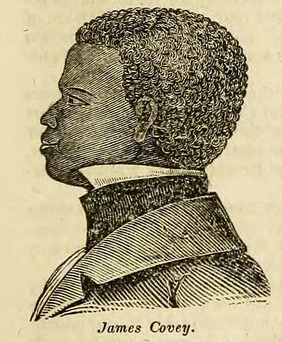James Covey facts for kids
James Benjamin Covey (born Kaweli; around 1825 – 12 October 1850) was a sailor. He is mostly known for being an interpreter during important court cases in the United States. These cases happened after a brave uprising in 1839 on a Spanish ship called La Amistad.
James Covey could speak both Mende and English. This skill was super important! It helped the Mende people from the Amistad ship talk to the court. Because of him, they could explain their side of the story. This helped them successfully defend themselves in court.
Contents
Who Was James Covey?
His Early Life and Kidnapping
James Covey was born around 1825 or 1826. His birthplace was in the mountains of what is now Sierra Leone, in West Africa. His African name was Kaweli, which means "war road" in the Mende language.
When he was only five or six years old, he was sadly kidnapped during a raid. He was then sold to the wife of a chief from the Bulom tribe.
A few years later, he was sold again, this time to a European slave trader. He was likely taken to a slave camp called Lomboko. From there, he was put on a ship to the Americas. This was happening even though the Atlantic slave trade was officially against the law. Covey was illegally shipped to Cuba on a Spanish ship named Segundo Socorro. Luckily, the British navy stopped this ship. Covey and the other captives were set free.
Life After Freedom
After being freed, James Covey was cared for by Rev. John William Weeks. He was part of the Church Missionary Society in Freetown. Covey went to school in Freetown for five years.
After school, he joined the British Royal Navy. In 1838, he became part of the crew of HMS Buzzard. He served under Captain Charles Fitzgerald. Covey arrived in New York City on the Buzzard in June 1839.
James Covey and the Amistad Case
Finding an Interpreter
Josiah Gibbs was a professor at Yale University. He was very dedicated to ending slavery. Professor Gibbs wanted to help the Africans who were involved in the Amistad uprising. These Africans were now in the care of the U.S. courts.
To help them, Gibbs learned to count to ten in Mende. This was the language most of the Africans spoke. He walked around the harbors in New Haven and later in New York. He kept counting aloud in Mende. Finally, some sailors recognized the words and approached him. This is how Gibbs met James Covey and another British sailor, Charles Pratt, in New York in October 1839.
Helping the Amistad Captives
Professor Gibbs brought both Covey and Pratt to New Haven. They stayed there safely with Lewis Tappan and the group helping the Amistad captives. Covey lived in New Haven for four months.
During this time, he translated what three Mende-speaking captives said. This was for the Amistad civil trial in Hartford, Connecticut, in 1841. Because Covey had been through similar experiences, he was perfect for explaining their story. He helped share the details of their kidnapping, the fear they felt, and their eventual rebellion.
The translated stories showed that the cook on the Amistad had scared the captives. He told them the crew planned to kill and eat them. Knowing this reason was key to understanding that the captives acted to protect themselves. The case eventually went to the U.S. Supreme Court. The Supreme Court decided that the captives were not slaves. They were free people who had legally defended themselves to gain their freedom.
Later Life and Legacy
Returning to Africa
In November 1841, James Covey went back to Africa. He traveled with 35 of the Amistad Africans who also chose to return home. They sailed on a ship called the Gentleman. Money for their trip had been raised by private donations. An American missionary named William Raymond went with them to Freetown.
His Final Years
It seems James Covey spent time with Christian missionary groups in Sierra Leone. There is some information that he might have gotten involved with a local leader. He may have even taken part in a slaving trip in 1845.
Later, he became sick. He was moved back and forth between a village called Kaw-Mendi and the main mission area, "America." James Covey passed away on 12 October 1850. He was given a Christian burial.
In Movies
In the 1997 drama film Amistad, James Covey's role was played by the British actor Chiwetel Ejiofor.
 | Roy Wilkins |
 | John Lewis |
 | Linda Carol Brown |


